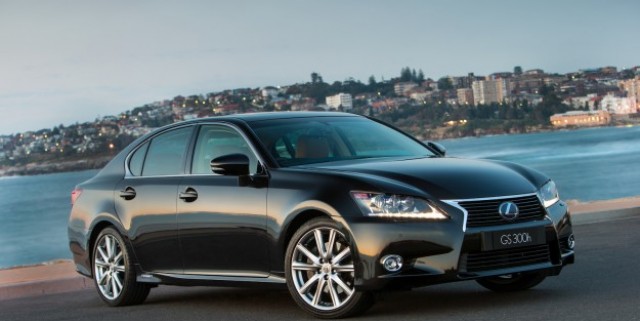
The 2014 Lexus GS has landed locally, with a new eight-speed automatic standard on all 3.5-litre petrol V6 models, active lane keeping assistance standard on all Sports Luxury grades, and a new four-cylinder hybrid GS300h specification filling the second tier of the range.
Making room for the newcomer, the entry-level GS250 powered by a 2.5-litre petrol V6 is no longer available in Sports Luxury specification, the remaining $77,000 GS250 Luxury and $85,000 GS250 F Sport each down just $45.
The GS300h adds $2000 to the price of those grades and tops out with the $102,000 Sports Luxury. It scores the same 2.5-litre petrol four-cylinder, electric motor and automatic continuously variable transmission (CVT) available in the smaller IS300h.
Producing the same 164kW of power, the GS300h claims 5.2L/100km combined consumption and scores a maximum five stars in the Federal Government’s Green Vehicle Guide.
Also aiding with squeezing in the GS300h, the GS350 with 3.5-litre petrol V6 and GS450h with a petrol V6 and electric motor combination are no longer available in standard Luxury specification, the F Sport grades costing $99,900 and $112,100 respectively, and the Sports Luxury $111,600/$123,500.
While the F Sport grades rise by between $200 (GS450h) and $855 (GS350), the Sports Luxury grades rise by between $1600 (GS450h) and $2555 (GS350) compared with the pre-facelift models. The latter rise is down not only to the active lane keeping assistance – which monitors car behaviour between white lines and will move the steering wheel to ensure the car remains in the centre of its lane – but also the addition of 19-inch alloy wheels, up from 18s, and LED fog lights.
The Lexus GS head-up display has also been upgraded with full colour graphics for navigation, audio and vehicle speed functions.
Lexus is determined to achieve a 50:50 sales split between petrol engines and hybrid models “within five years” according to Lexus Australia CEO Sean Hanley.
Currently around 30 per cent of all Lexus GS models sold are hybrids, but Hanley doesn’t expect this to change much initially for reasons of range substitution and tight supply.





